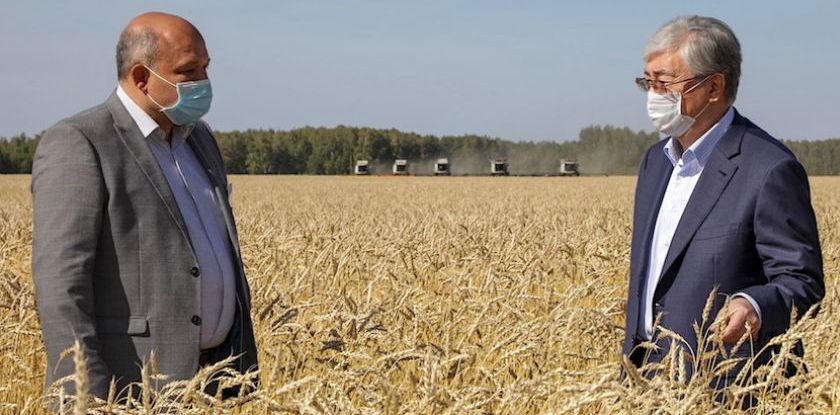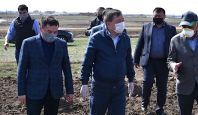On March 19, 2021, Prime Minister of the Republic of Kazakhstan Askar Mamin formed the Land Reform Commission (Decree No. 62-r), defined its tasks, structure, rules of procedure and personnel. The public learned about it from the announcement published on March 23, 2021, on the Ministry of Agriculture’s e.gov page.
Interestingly, the announcement mainly concentrates on the personnel of the Commission leaving out information on «the general provisions, tasks, structure and rules of procedure». And our attempts to find a full text of Decree No. 62-r in order to study it and make our comments have been unsuccessful.
Quite possible it is not a coincidence or an oversight on the part of the officials but rather a conscious decision. Because, thanks to such an approach, the attention of the media and civil activists is now drawn exclusively to the members of the Commission. Even though the latter is but a consultative body affiliated to the government and all its future suggestions may be either accepted or rejected by it.
On the other hand, there is little chance that the Land Reform Commission is going to deviate from Akorda and the Library’s overall strategy is a significant way. Because the three leaders of the Commission (the chairman, the deputy chairman and the secretary) are top-rank officials directly linked to the agricultural sphere. And also because, apart from them, the Commission includes Nur Otan’s top manager, 14 Mazhilis and Senate deputies and 17 deputy akims of the regions and the cities of national significance, in other words, the people carefully selected in terms of their loyalty to the system and its political course.
As for the civil society and business-community, they are represented by 45 persons who, with rare exception, fit in to the Kazakh way of life beautifully and, therefore, are unlikely to start rioting. Moreover, most of them, due to objective and subjective reasons, do not desire to make any cardinal changes in the sphere of owning, using and managing agricultural lands.
For these reasons, we do not see a point in commenting on the personnel of the Land Reform Commission as well as forecasting the results of its activities albeit it may be interesting to compare this agency to the same structure of 2016.
We are going to limit ourselves to registering the consequences of President Tokayev’s decision (undoubtedly, approved by the First President of Kazakhstan Nursultan Nazarbayev). We are talking about banning the sale of agricultural lands to foreign nationals and to the companies with foreign participation.
We have outlined these consequences in our last year’s publication «The Three Main Problems of the Agricultural Complex». Here are some quotes from this article.
«We believe that such a sensitive issue as the introduction of private ownership of farmlands in Kazakhstan will not be resolved for at least next two generations. Since the people that can be called latifundists of large landowners are the main opponents of such a possibility. These are the people who, over the years of independence, had gained official or unofficial control (by seizing, stealing, buying — underline as appropriate) of the large parcels of land measured by tens of thousands and thousands hectares that previously belonged to the sovkhzes and kolkhozes.
However, having gained control of the land, many a newly born latifundists did not manage to organise a normal business on their land. With that, none of them is going to part with their assets. It is these people (that the country has enough of — several thousands persons we believe) that, during the past years, have been able to suppress (with the help of the seemingly spontaneous public protests, among other things) all the not so assertive attempts of the state to change something in this sphere.
Of course, the authorities are trying to change something, among other things, by establishing external monitoring of the usage of farmlands and increasing their taxing when the lands are used inappropriately. However, we doubt the efficiency of these efforts. Simply because the state agencies involved in solving this problem, starting from the industry-related agencies and ending with the local authorities of all levels, are existing under the influence (if not the direct control) of the latifundists. Moreover, quite often the attempts of officials to install some order, de-facto, serve as the acts of redivision of property or help providing a reason to conduct it».
In addition, we would like to note that forming of such a representational land reform commission (80 persons) is but a political manipulation on the part of Akorda and the Library for the purpose of fighting off the lashing of those who -
a) think it necessary to privatise agricultural lands;
b) do not agree with the current distribution of the lands and insists on their repartition;
c) are trying, without much cost and effort, to gain support of those who own or control the lands in the country.
Since this kind of grand gesture will cost nothing to the Kazakh authoritarian political system and the «super-presidential» vertical and, at the same time, corresponds to the interests of the majority of the ruling elite and officials, let us congratulate Kossym-Jomart Tokayev and his team on the smart political decision.
As for the fact that it is going to result in the conservation of Kazakhstan’s agricultural complex and its even greater marginalisation in comparison with foreign competitors, it is not an important issue for those abusing power in the country. To them, the important issue is that they retain control of the land and may continue abusing it to their own advantage.





